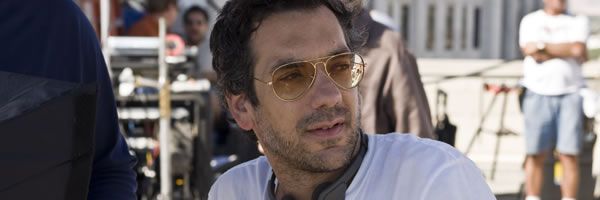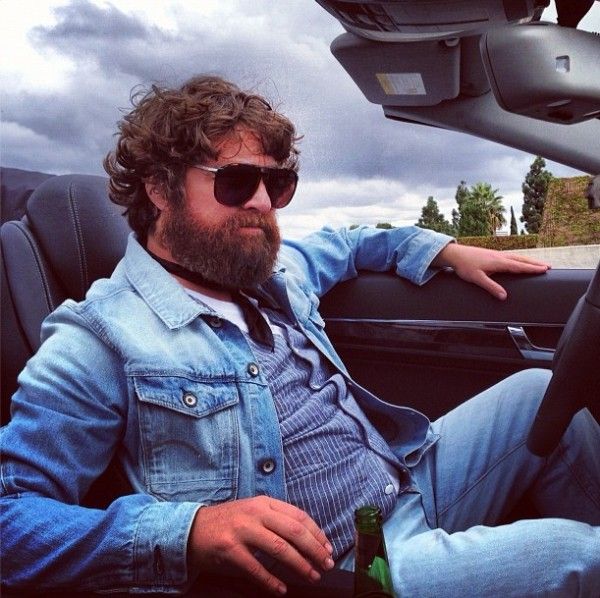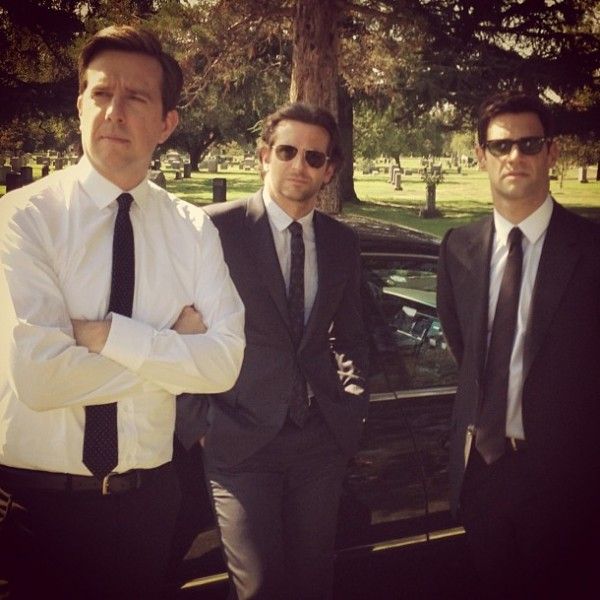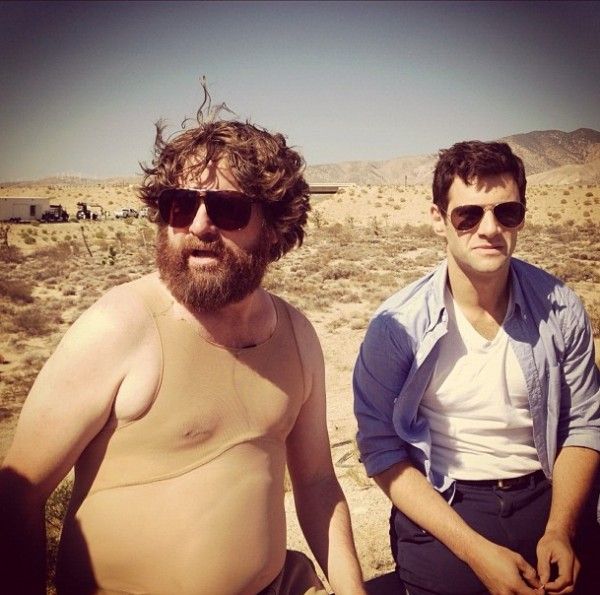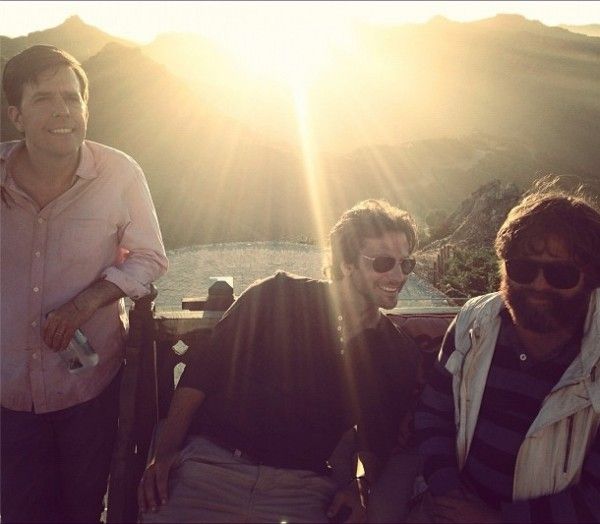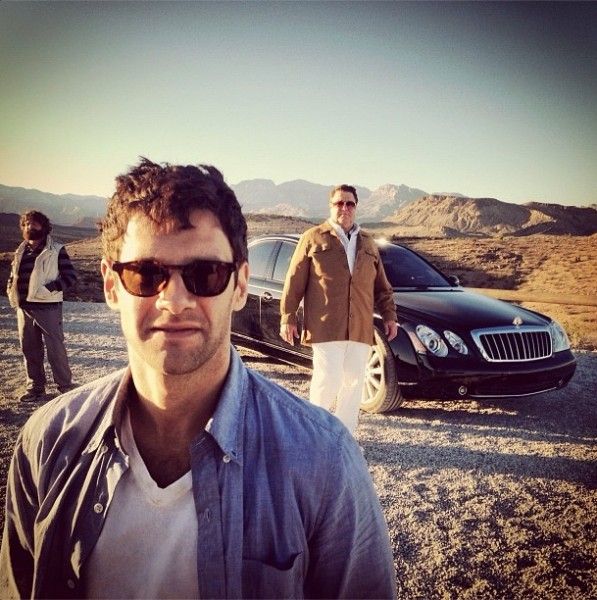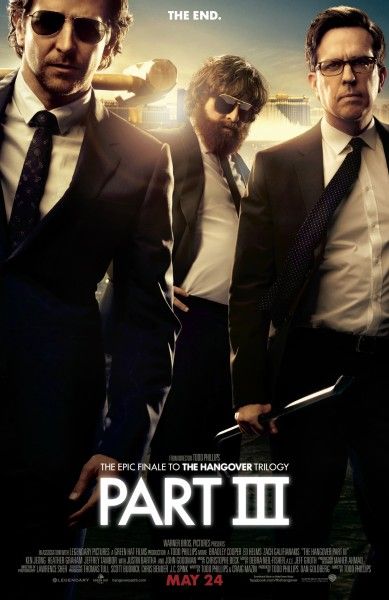Around Thanksgiving of last year, a group of journalists was invited to the set of Warner Bros.' The Hangover Part III, writer/director Todd Phillips' conclusion to The Hangover trilogy. During our roundtable interviews, Phillips talked about the darker but more realistic tone of the final chapter and how it focuses on Alan (Zach Galifianakis). There are still plenty of laughs to be found, but Phillips stressed that Part III is more about the resolution of these characters and their emotional baggage rather than the hook of a forgotten night of partying.
The film stars Bradley Cooper, Ed Helms, Justin Bartha, Ken Jeong, Heather Graham, John Goodman, Mike Epps and Jeffrey Tambor. The Hangover Part III opens on May 24th and, if you haven't seen it, you can check out the recently-released trailer here. Hit the jump for the full interview with Phillips.
Question: Can you start off by telling us, because I know people wouldn't want to say so much, what the story is this time around?
PHILLIPS: This story is basically-- This is Alan's story, in a way. And it's funny, because I've read on the Internet how people say it's about breaking Alan out of a mental institution, which I can honestly tell you it is not about. I don't know how that got started. I actually do know how it got started. Zach said that as a joke.
Yeah, he said that.
PHILLIPS: And then people knew it was a joke, but then sometimes it gets re-translated and then it becomes the truth. It's not about that, but it is, in a weird way, Alan's story, and it is also a fitting finale to the story of all four guys, five guys counting Chow. It is a fitting end to the trilogy. Like, plot-wise, what it's about? It's not a hangover, it's not a missing night. There's no drinking in the movie, or excessive drinking, I should say. It just takes a totally different turn, and it catches the guys two years after the last movie and where they are in their lives. And it's kind of a movie about a crisis. Alan, his own personal crisis, is probably the best way to describe it. Best way of saying something without saying anything.
I print it-- Yeah, yeah, yeah. You announced this was going to be the last one just before the second one came out, at the junket. Is there any apprehension about wrapping things up?
PHILLIPS: Well, outside of the fact that I love working with these guys and I think they like working with me, and we have a great crew that I've done-- Some of these guys I've worked with on eight movies. This is just a good unit we have going. That's the only apprehension. But I don't feel-- I think maybe at the premiere or at the real press junket I'll feel a little sadness or apprehension, but right now I'm excited about it.
And there is an interesting tonal shift between the first movie and the second. Where does that go with this film?
PHILLIPS: Well, much to the chagrin of some people, it goes darker, I think. Which I like. And that's always-- All my movies, as I get the ability to do it, they tend to go a little darker, a little darker. And this movie-- Funnily enough, there's a line in this scene that we shot yesterday, which I turned to Dan Goldberg, my producing partner, and I said, "That's the tagline for the movie." Which is when Chow turns and he goes, (imitating Chow) "And then, everything went black." Everything Went Black is also the title of a Black Flag album, but it's also a great tagline for this movie in a weird way. Because "everything went black" makes you think, "Oh, is it another blackout?" No, no, no. It just got very dark.
Craig was saying how you kind of go all over the place with this. You're in the desert, you're in L.A., you're in Vegas. Were you guys on location for a lot of this stuff, too, or were you guys--
PHILLIPS: A lot, yeah. Yeah, we were mostly on location. The movie's kind of winding down, so we always end up on stages to shoot interiors and things like that. But yeah, the movie brought us-- Well, we were in L.A., we were in Ti-- Well, not Tijuana, but something substituting for Tijuana. We're in Vegas, we're out in the middle of nowhere. It has a certain southwestern vibe to it. I mean, it's not a travel movie like the other two. They're moving because they're on the move, you know what I mean?
Sure.
PHILLIPS: It's not like a destination movie, so to speak.
How far along are you now in the process of production? Do you know the day or around what day--
PHILLIPS: Well, we're in day forty-something of sixty. So, maybe forty-two. Yeah, I think after Thanksgiving we have three weeks left and a week out in the field around L.A. and then two weeks back here.
You don't need to go into any specifics, but are there things that are-- In the past, you've pushed boundaries in terms of rating and things we see. Is there anything you've been apprehensive about shooting or are anxious to shoot?
PHILLIPS: I think we have a pretty epic opening to this movie. There's a little bit of a preamble opening and then we have a pretty epic open. But there's nothing I've been nervous about shooting for ratings reasons or pushing the boundaries. There's just, I think, some pretty epic things in this movie that we were really excited to shoot, some of which we've shot already and one thing that we haven't shot yet.
And you mentioned that with more freedom you've been able to go dark. Do you feel that with this trilogy, because it's been as successful as it is, that you've really been able to maximize on whatever you wanted to do?
PHILLIPS: I feel like people stick with it, and I think it's a testament to the three actors more than anything. They're just such a believable group of friends that we can put them through whatever paces we want and people will go along for the ride. I do think that number two got a little bit darker than the first one and I think it was appropriate where we wanted to take it, and I think people went along for the ride. So with this one, it's not so much darkness for darkness' sake, it's like the stakes get amped up a little bit. So when the stakes get amped up, things tend to go a little darker. It gets a little more real in a way. Like "Oh, shit just got real" sort of thing. People die in this movie.
Yeah?
PHILLIPS: Yeah.
We are hearing there's a lot of call-backs to the other one, some characters coming back.
PHILLIPS: Yeah. Yeah, there's some call-backs. It's not a secret Heather Graham makes an appearance in the movie. Yeah, there are some people that reappear. What's fun about the movie is that it all kind of makes sense. None of the movies take place without the knowledge of the others. In other words, they all-- The second one took place having gone through the experience of the first one. They referenced it, they talk about it. This is the same thing. And it kind of completes a circle, where people appear that you go, "Oh, that's who that was. Oh, I see." It's that kind of thing. Which is a fun thing for us to write and it was a fun thing to figure out.
Is there a reason behind why there's been a two-year gap between both of them? In the actual--
PHILLIPS: A two-year gap?
In the timeline of the story. Is that intent?
PHILLIPS: Not really. It's just this is when we catch up with them.
Okay.
PHILLIPS: Yeah, it's not specifically-- This crisis that's happening now happens to be two years later.
As a writer, this is the most time you've spent with the same characters, I would imagine.
PHILLIPS: Yeah, it is.
Does it make the process easier?
PHILLIPS: I think it makes it easier in some respects, because you just know what Alan would say at this moment. We'd just look at each other and we'd go, "Clearly, it's that." And it's harder also, because you go, "Oh, is this the same sort of vibe?" Or "Is this the thing--" You know? So you're trying to change up-- I mean, I think it's how television works. People say, "Oh, you're doing a third Hangover. How can you do a third Hangover?" It's like, people do twelve years of television shows and nobody says, "How do you do that?" Because they love the characters and you're involved in it. I don't feel like we've spent too much time with them. I love being able to explore Alan, Chow and Bradley deeper in these things. It's what they get away with in television. It's why we love shows on HBO that are-- You're getting more into it and more into it.
Craig was talking about doing Alan's House for a sitcom. Are you on board with that?
PHILLIPS: So it's called Alan's House?
Exactly.
PHILLIPS: I don't know. I don't like that title.
Does Mr. Creepy get to make an appearance?
PHILLIPS: He reappears for a moment, yeah. He does. He's up to no good again. For no reason.
Now, you said this will be the last one. Obviously three is a nice number to end on, I guess, for a series. But why not do a fourth one?
PHILLIPS: I think, oddly-- And it is funny how a lot of movies do three and then they just sort of-- It does feel like the story that we're telling ends here. Because it feels like the one thing that was unanswered in those movies was, how is this guy going to turn out? Meaning Alan. How is he going to be okay? It doesn't make sense. So I feel like, through this, once that's complete there isn't really much else to do with it. We wouldn't do it. Yeah, we would never do another one.
And you mentioned earlier that you had been planning this third part of the series for a while. How much did it change while going through that development process?
PHILLIPS: It still changes with time. The idea was, "Oh, let's do another one and let's take it in this direction," but the specificity of things and the story, that changed so many times. It changes through the writing, it changes through even the shooting. So it does change a lot. It's not like it was this architect laid-out blueprint that just sort of worked perfectly. We're constantly fixing it.
Ken was talking about how he was on for four days in the first Hangover and how this role has really evolved going into this one. Was there anything specific that you wanted to grow? Was this a character you wanted to go from--
PHILLIPS: (interrupts) Well, it's the same thing I was talking about with television. It's like, these writers in TV, they fall in love with certain characters. And I see it like-- If you watch a show like Homeland, and it's like, "Oh, that character didn't seem like a big deal in the beginning, but clearly they fell in love with this character," and they keep-- And I think Chow's a perfect example. Chow was never meant to be more than a four-day part in a movie. The movie was huge, people loved it, people got a kick out of Chow, we make it a little bigger. It's sort of like writers falling in love with their characters, and the same thing, I think, happens in television all the time.
You fall in love with them, but you torture them.
PHILLIPS: But you talk to them?
Torture them.
PHILLIPS: Torture them, of course. Yeah, that's true.
If Bradley Cooper gets an Oscar® nom for Silver Linings Playbook, are you going to work that into the marketing?
PHILLIPS: I don't know, I don't work in-- I doubt it. I mean, I don't know. That's a good . That would be a marketing . Is that a serious question?
Because I'd love to see "With Academy Award® nominee, Bradley Cooper."
PHILLIPS: Sure. Yeah. I think that's good. I got nominated for an Academy Award® for writing Borat. We don't work it into the-- For being a writer on Borat. We never work it in.
Well, if you have two nominees, then it really tips it over.
PHILLIPS: But when you have two-- That's right. It's true. Yeah.
Craig was actually mentioning that--
PHILLIPS: Zach got nominated, I think, for Out Cold, didn't he? I take shots at Zach whenever I can.
And Craig actually said that there was an element from the first film that most people had been overlooking that's going to be reintroduced in this film. Is that something you just stumbled across and realized that it would be a cool thing to bring back? Obviously, I don't want to reveal--
PHILLIPS: No, no. It's not something we stumbled across, it was something-- As we were talking about, again, the movies being all in one universe, that we talked about-- "You know what would be interesting? A thing we never explored is this."
As far as Tijuana research, was that already taken care of on your end?
PHILLIPS: Yeah, I had that covered. But we don't really go there in the way we do Veg-- It's a funny thing, in all of these movies, we don't do the cities like you think because we're doing them the next day in the other two movies. And in this one, they're not there partying in Tijuana, they're there for information and because of a lead, sort of. This movie is very much a little bit of a mystery, a little bit of a heist movie, a little action in it. But we always have some action in the movies.
Well, I'm curious about the John Goodman role. Is it similar to what was seen with Paul Giamatti in the second film, or is it a different type of role?
PHILLIPS: I think it's pretty different. He's a pretty dark guy in this movie, as everybody's a little bit darker. John Goodman's pretty dark-- I love John Goodman. He was so fun to work with. We're done with him now, but he just came in for, I don't know, maybe two weeks, and he was just great to work with.
Thanks so much.
PHILLIPS: All right. You sticking around today, or--
We're going to stay here.
PHILLIPS: Yeah, this scene takes place in-- This is retarded, but it'll cut together. You'll see.
Thank you. Thanks a lot.
PHILLIPS: It's hard to explain.
Be sure to get caught up on all of our other coverage from the set visit of The Hangover Part III via the following links:
- 45 Things to Know About THE HANGOVER PART III from Our Set Visit
- Ken Jeong Talks THE HANGOVER PART III, His Evolving Career, Chow’s Relationship with the Wolfpack, Getting to Do More Action & More from Our Set Visit
- Zach Galifianakis Talks THE HANGOVER PART III, Alan’s Character Arc, Revisiting Alan’s Family, Wolfpack Character Relationships & More from Our Set Visit
- Ed Helms Talks THE HANGOVER PART III, Character Relationships, Location Shoots, Returning Characters, Concluding the Trilogy & More from Our Set Visit
- Bradley Cooper Talks THE HANGOVER PART III, Character Relationships, Concluding the Trilogy, Going Back to Vegas, Oscar Buzz & More from Our Set Visit
- Writer Craig Mazin Talks THE HANGOVER PART III, Concluding the Trilogy, Where the Film Takes Place, Returning Characters & More from Our Set Visit
The Hangover Part III opens May 24th.

